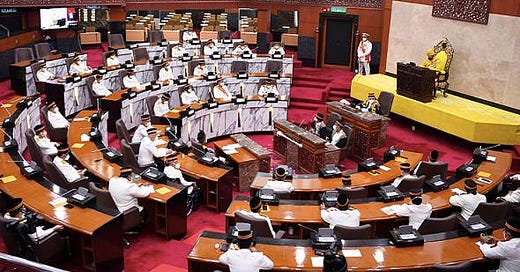Concerns over parliamentary sovereignty and government transparency
Free speech under attack, while government becoming more opaque
Reports over Selangor opposition leader Azmin Ali being called up to report to the police are confusing.
Earlier news reports stated that Azmin Ali is being investigated for questioning the finances of the Selangor State Development Corporation (PKNS). Azmin himself at a press conference said he had been summoned to meet the police under Section 111 of the Criminal Procedure Code. This provision allows for the police to call in anybody to the police station to assist in investigations. They can be detained up to 48 hours in custody to assist, if need be.
After Azmin said he would challenge being summoned to the police in court, the Selangor police stepped in and said they were summoning Azmin to provide a statement at the Shah Alam District Headquarters under Section 112 of the Criminal Procedural Code, in relation to facilitating an investigation into the disclosure of information from the PKNS.
Grave concerns
No matter which version is true, there are grave concerns.
If Azmin, who is the Selangor Hulu Kelang state assemblyperson was called up to the police under Section 111, then this is a direct attack upon the principle of parliamentary immunity or parliamentary privilege by the police. The parliament is the supreme law maker and the police should never question the sovereignty of the parliament. This parliamentary privilege is enshrined in both the federal parliament and state legislatures. This cannot be disputed by any body or court in the land, unless it is repeated outside the parliament.
If, as the police are now saying, Azmin was called up under Section 112, then the police are actually hindering members of the parliament question the government over financial issues. This destroys government transparency, and the right of parliamentary members to investigate the workings of government.
In both of the above cases, the police could be seen in hindering democracy, transparency of government, and even assisting on covering up any potential corruption that may arise anywhere in the country.
Abuse of power by political appointees to government agencies
Recently, the police have been taking action against people in Selangor who are talking about financial issues and contracts. The common thread is MRCB, whose director is also the chairman of the Malaysian Communications and Multimedia Commission (MCMC). There are risks that the Malay-Kongsi networks may have direct or indirect influence upon Malaysia’s law enforcement apparatus. The integrity of the Royal Malaysian Police is at stake.
There must be an inquiry into political appointments made to Malaysia’s agencies and GLCs and the effects on government integrity and law enforcement. Malaysia cannot afford the further erosion of its fragile democracy. Checks and balances on law enforcement are being compromised, turning the police into an institution that protects sectional interests.
Subscribe Below:





Ask PMX Anwar Ibrahim what has happened to Malaysia democracy.
Malay centric govt: when in power you can do what you like. Started in 1957, and gradually getting worse. Now people can get DNAA, can get acquittal too, house arrest for the biggest heist ever etc.